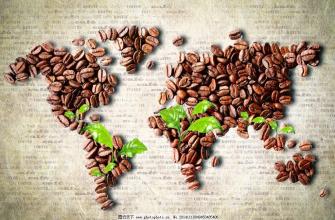Introduction to the method of taste treatment of varieties with grinding scale for flavor description of Cuban crystal mountain coffee beans
In Cuba, most of the coffee beans are picked by hand. Coffee beans are picked about every half a month during the ripening period. During or after picking, coffee beans are classified and those immature and bad beans are removed to ensure the quality of the coffee. Cubans usually deal with coffee beans in two ways-tanning and washing. Tanning is the simplest, cheapest and most traditional way to treat coffee, which is to let the coffee fruit dry in the sun but not ferment. The general drying time is about four weeks. The washing rule allows the aroma of fruit to enter more into the coffee beans, thus adding a kind of coarse mineral fruit flavor to the coffee Cubita are produced from the pollution-free Crystal Mountains of Cuba, which are geographically adjacent to the Blue Mountains of Jamaica and have similar climatic conditions, comparable to Jamaican Blue Mountain Coffee. Crystal Mountain is also known as the Blue Mountain of Cuba. As a result, there are many coffees under the banner of the Cuban Blue Mountains, but the purest Crystal Mountain Coffee Cubita is the top coffee allowed to use the Cuban "Crystal Mountain Coffee" and has become a coffee designated by the Cuban Embassy to drink it. At present, Crystal Mountain Coffee is synonymous with top Cuban coffee.
Cubita adheres to the principle of perfect coffee, only makes individual coffee, the picking of coffee beans is done by hand, and all the particles of coffee beans are strictly selected according to the standard of sieve 17-19, plus washing coffee beans, to a large extent, remove defective beans and other impurities to ensure the quality of coffee. It has a high reputation in the coffee industry. Careful people will find that Cubita is indescribably unique with other coffee. Cubita is not like Italian coffee, which tastes bitter and knight-like; unlike the arrogance of Blue Mountain Coffee, it feels like an emperor. But Cubita is like an elegant princess, with a sense of natural tenderness, nobility, tenderness and elegance. Excellent balance, a good combination of bitter and sour taste, there will be a meticulous, smooth, refreshing and elegant feeling when tasting, which is the best enjoyment of coffee.
Cubita is produced in coffee from the pollution-free Crystal Mountain in the high altitude of Cuba, which is adjacent to the Blue Mountain Mountains of Jamaica and has similar climatic conditions, comparable to Jamaican Blue Mountain Coffee. Crystal Mountain is also known as the Blue Mountain of Cuba. As a result, there are many coffees under the banner of the Cuban Blue Mountains, but the purest Crystal Mountain Coffee Cubita is the top coffee allowed to use the Cuban "Crystal Mountain Coffee" and has become a coffee designated by the Cuban Embassy to drink it. At present, Crystal Mountain Coffee is synonymous with top Cuban coffee.
Cubita adheres to the principle of perfect coffee, only makes individual coffee, the picking of coffee beans is done by hand, and all the particles of coffee beans are strictly selected according to the standard of sieve 17-19, plus washing coffee beans, to a large extent, remove defective beans and other impurities to ensure the quality of coffee. It has a high reputation in the coffee industry. Careful people will find that Cubita is indescribably unique with other coffee. Cubita is not like Italian coffee, which tastes bitter and knight-like; unlike the arrogance of Blue Mountain Coffee, it feels like an emperor. But Cubita is like an elegant princess, with a sense of natural tenderness, nobility, tenderness and elegance. Excellent balance, a good combination of bitter and sour taste, there will be a meticulous, smooth, refreshing and elegant feeling when tasting, which is the best enjoyment of coffee.

Important Notice :
前街咖啡 FrontStreet Coffee has moved to new addredd:
FrontStreet Coffee Address: 315,Donghua East Road,GuangZhou
Tel:020 38364473
- Prev

Introduction of Kenya Coffee Flavor description method Grinding scale Manor production area
Kenyan coffee flavor description method grinding scale manor production area introduction this stage requires a total of 6 concentric circles. After the smallest flow of water is injected into the center point by hand for 2 seconds, the concentric circle is around the first circle, and then each concentric circle is enlarged 1 turn accordingly. To the fifth concentric circle, about 12.5px away from the wall of the filter cup, all powder layers will be wet to water and washed away. Then, again.
- Next

Introduction to El Salvador Coffee Bean Flavor description Grinding scale treatment Manor
Salvadoran coffee ranks side by side with Mexico and Guatemala as the producers of Asa and Merdo, and is fighting for the top one or two places in China and the United States with other countries. The highlands of origin are large coffee beans of all sizes, which are fragrant and mild in taste. Like Guatemala and Costa Rica, coffee in El Salvador is graded according to altitude, and the higher the altitude, the better the coffee
Related
- Detailed explanation of Jadeite planting Land in Panamanian Jadeite Manor introduction to the grading system of Jadeite competitive bidding, Red bid, Green bid and Rose Summer
- Story of Coffee planting in Brenka region of Costa Rica Stonehenge Manor anaerobic heavy honey treatment of flavor mouth
- What's on the barrel of Blue Mountain Coffee beans?
- Can American coffee also pull flowers? How to use hot American style to pull out a good-looking pattern?
- Can you make a cold extract with coffee beans? What is the right proportion for cold-extracted coffee formula?
- Indonesian PWN Gold Mandrine Coffee Origin Features Flavor How to Chong? Mandolin coffee is American.
- A brief introduction to the flavor characteristics of Brazilian yellow bourbon coffee beans
- What is the effect of different water quality on the flavor of cold-extracted coffee? What kind of water is best for brewing coffee?
- Why do you think of Rose Summer whenever you mention Panamanian coffee?
- Introduction to the characteristics of authentic blue mountain coffee bean producing areas? What is the CIB Coffee Authority in Jamaica?

